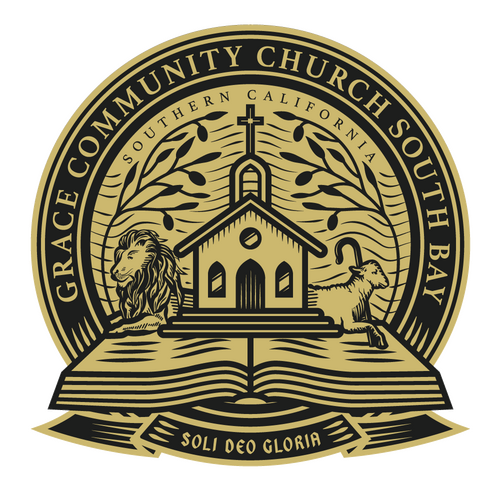What is Communion?
Here at Grace Community Church South Bay, we teach that our Lord Jesus Christ gave the local church two ordinances: baptism and the Lord’s Supper (Acts 2:38–42). Both are essential to our worship, and both deserve careful, prayerful participation.
The Lord’s Supper—also called communion—is the practice of remembering and proclaiming Christ’s death until He comes again (Luke 22:19; 1 Cor. 11:26). Each month, we as a church family partake of the bread and cup, representing the body and blood of our Lord. This is not a mere ritual, but an actual fellowship with the risen Christ, who indwells every believer by virtue of His death in our place (1 Corinthians 10:16). Communion is rich in meaning, reaching backward, inward, and forward.
The Lord’s Supper—also called communion—is the practice of remembering and proclaiming Christ’s death until He comes again (Luke 22:19; 1 Cor. 11:26). Each month, we as a church family partake of the bread and cup, representing the body and blood of our Lord. This is not a mere ritual, but an actual fellowship with the risen Christ, who indwells every believer by virtue of His death in our place (1 Corinthians 10:16). Communion is rich in meaning, reaching backward, inward, and forward.
Reaching Backward
The Lord’s Supper, instituted by Jesus on the night of His betrayal, is rooted in the Passover. On the night before Israel’s deliverance from Egypt, God called His people to celebrate the Passover meal, reminding them of His mercy in “passing over” them in judgment (Exodus 12:13). On the night He was betrayed, Jesus transformed that meal into something even greater: whereas Passover celebrated deliverance from Egypt, the Lord’s Supper celebrates God’s gracious deliverance of all who believe—from sin, Satan, and eternal death—through the blood of Christ, our true Passover Lamb (1 Cor. 5:7).
Reaching Inward
Paul commands believers: “Let a person examine himself, then, and so eat of the bread and drink of the cup” (1 Corinthians 11:28). To eat and drink “in an unworthy manner” brings judgment rather than blessing (1 Cor. 11:29). This means the Supper calls us to honest self-examination: Are we walking in repentance? Are we seeking to live “in a manner worthy of the Lord, fully pleasing to Him” (Colossians 1:10)? Communion is not for perfect people, but it is for repentant people—those clinging to Christ, not to sin.
Reaching Forward
The Lord’s Supper also looks ahead to the glorious “marriage supper of the Lamb” (Revelation 19:9), when Christ will finally unite with His purified Bride, the Church. Each time we partake, we do so with expectation: death will be swallowed up in victory (Isaiah 25:8), Satan’s head will be crushed forever (Genesis 3:15), and Christ will reign with His people in joy everlasting. Communion points us forward to that final feast.
Who Should Partake—and Who Should Not
Because of the sacred nature of this meal, we must also remember who should and who should not come to the Table.
Those who should partake:
Those who should not partake:
This is not to exclude sinners—indeed, communion is for sinners saved by grace! But it must not be taken lightly. To come without faith, without repentance, or without reconciliation is to eat and drink judgment on oneself (1 Corinthians 11:29).
Those who should partake:
- All who have repented and believed in Christ for salvation (Mark 1:15).
- All who come with faith, humility, and a desire to walk with Him.
Those who should not partake:
- The unbelieving—those who have not yet trusted Christ (John 3:36).
- The unrepentant—those clinging to sin rather than Christ (1 Cor. 11:27–30).
- The divisive—those refusing reconciliation with brothers and sisters in Christ (Matthew 5:23–24).
This is not to exclude sinners—indeed, communion is for sinners saved by grace! But it must not be taken lightly. To come without faith, without repentance, or without reconciliation is to eat and drink judgment on oneself (1 Corinthians 11:29).
Focusing Our Hearts & Minds
Communion, then, is a holy practice of remembering Christ’s saving work, examining our hearts, and anticipating His return. As we gather around the Lord’s Table as a family, let us set aside distraction, humble ourselves before Him, and rejoice in the gospel—that Christ died for our sins, was raised in victory, and is coming again.
“For as often as you eat this bread and drink the cup, you proclaim the Lord’s death until He comes” (1 Corinthians 11:26).
“For as often as you eat this bread and drink the cup, you proclaim the Lord’s death until He comes” (1 Corinthians 11:26).
"For I received from the Lord that which I also delivered to you, that the Lord Jesus, on the night when He was betrayed, took bread; and when He had given thanks, He broke it and said, “This is My body, which is for you; do this in remembrance of Me.” In the same way He also took the cup after supper, saying, “This cup is the new covenant in My blood; do this, as often as you drink it, in remembrance of Me.” For as often as you eat this bread and drink the cup, you proclaim the Lord’s death until He comes."
- 1 Corinthians 11:23-26 (NASB)
- 1 Corinthians 11:23-26 (NASB)
